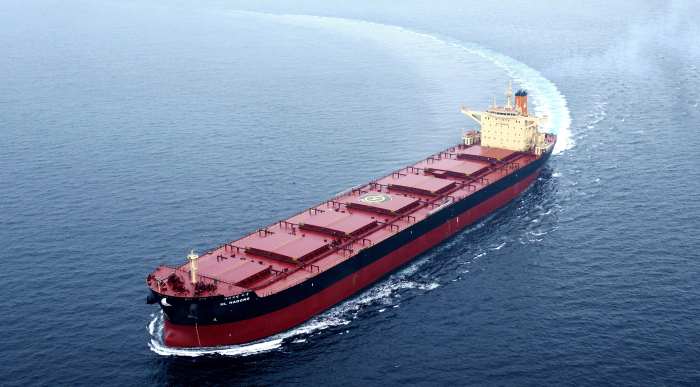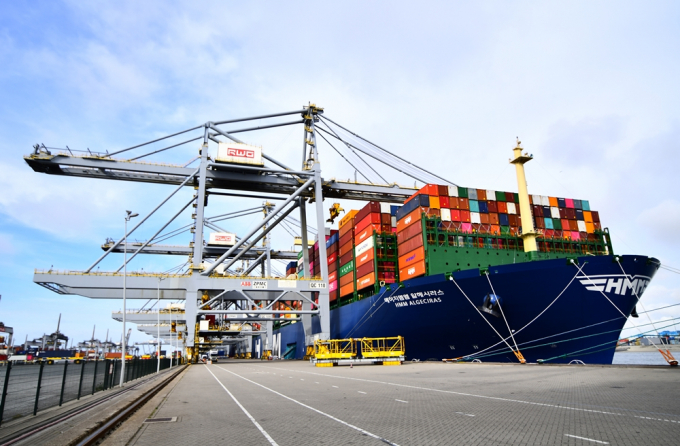Riding cargo boom, H-Line Shipping resumes IPO process
By May 03, 2021 (Gmt+09:00)
LG Chem to sell water filter business to Glenwood PE for $692 million


Kyobo Life poised to buy Japan’s SBI Group-owned savings bank


KT&G eyes overseas M&A after rejecting activist fund's offer


StockX in merger talks with Naver’s online reseller Kream


Mirae Asset to be named Korea Post’s core real estate fund operator



H-Line Shipping, owned by a fund led by private equity firm Hahn & Co., has recently notified its IPO managers Mirae Asset Securities Co. and NH Investment & Securities Co. of its decision to revisit the IPO plan, according to investment banking sources on May 3.
Back in 2018, Seoul-based Hahn & Co. tried to list the bulk shipping company to cash out of its investment, but halted the process due to a protracted slump in the shipping industry.
If H-Line Shipping is allowed to use a fast-track IPO process, it may be able to list on the Korea Exchange in the fourth quarter of this year. If listed, it will become the first Korean shipping company IPO since its smaller rival KSS Line Ltd. went public in 2007.
H-Line Shipping was created after Hahn & Co acquired the liquefied natural gas transportation business from the now-defunct Hanjin Shipping Co. for 550 billion won in 2014. Subsequently, it absorbed the dry bulk transportation business from Hyundai Merchant Marine Co., now renamed HMM Co., for 120 billion won in 2016.
Last year, the private equity firm transferred H-Line to a 1.8 trillion won special purpose company (SPC) that raised 1 trillion won in equities and 800 billion won in debts. Hana Financial Group injected 300 billion won into the SPC as an equity investor and arranged the 800 billion won debt financing.
H-Line Shipping operates vessels to import raw materials such as iron ore, coal and LNG for Korean companies under long-term contracts. Steelmaker POSCO Co., utility KEPCO and KOGAS are among its clients.
Surging sea freight rates, coupled with a shortage of bulk carriers, have been improving the bottom line of Korean shipping companies, with the global economy staging a faster-than-expected recovery.
The Baltic Dry Index, a benchmark sea freight index, has shot up 373.5% over the past year. It came to 3,007 on Apr. 29, surpassing 3,000 points for the first time in 11 years.
In 2020, H-Line Shipping's revenue edged down 3% to 700.6 billion won ($624 million) from a year earlier, but operating profit remained steady at 186 billion won. This year, the company is widely expected to post stronger results with shipping demand far outpacing supply amid a freight crunch.
RETURN TO CAPITAL MARKETS
Soaring shipping demand led to a sharp increase in shipbuilding orders. Globally, new shipbuilding order volume has leapt 158% year-on-year to 10 million compensated gross tonnage (CGT) in the first quarter of this year, according to Clarksons Research Services, a global shipping industry tracker. Korean shipbuilders swept more than half of the volume, accounting for 5.3 million CGT, which represented a 867.5% surge from the year-earlier period.
Rising demand for eco-friendly carriers to meet tougher greenhouse gas emissions standards adds to the quicker-than-expected recovery in the shipbuilding industry.
With both the shipbuilding and shipping industries, which were once seen to be past their prime, making a strong comeback, they began to tap the capital markets to benefit from improved funding conditions.

Hyundai Heavy Industries Co., the world's largest shipyard, raised 300 billion won in a bond last March, marking its first bond issuance in almost six years. Hyundai Heavy, 100%-owned by Korea Shipbuilding & Offshore Engineering Co., is seeking to go public in the second half of this year to raise 1 trillion won.
If the world's largest shipbuilder succeeds in raising 1 trillion won, it will become the first Korean shipbuilder to raise that amount in the domestic stock market since Samsung Heavy Industries Co. raised 1.4 trillion won in a new share sale in April 2018.
"Both shipping and shipbuilding companies, which had long stayed in the shade, have now entered an upcycle, set to make heavy profits," said an investment banking source. "Other shipbuilders and shipping firms, which have yet to return to the capital markets, will join the capital-raising spree if they are convinced of the change in investor sentiment."
Write to Jin-seong Kim and A-Young Yoon at jskim1028@hankyung.com
Yeonhee Kim edited this article.
-
 Logistics challengesKorea’s Busan port congestion worsening with boxes stacked, ships delayed
Logistics challengesKorea’s Busan port congestion worsening with boxes stacked, ships delayedMay 03, 2021 (Gmt+09:00)
4 Min read -
 Logistics challengesSurging freight rates, bulker shortages squeeze Korean importers
Logistics challengesSurging freight rates, bulker shortages squeeze Korean importersJan 21, 2021 (Gmt+09:00)
3 Min read -
 Shipping industryFreight crunch pushes S.Korean export firms into crisis
Shipping industryFreight crunch pushes S.Korean export firms into crisisApr 25, 2021 (Gmt+09:00)
3 Min read -
 Logistics challengesHMM, SM Line to deploy container ships to support Korean exporters
Logistics challengesHMM, SM Line to deploy container ships to support Korean exportersJan 22, 2021 (Gmt+09:00)
1 Min read -
 Shipbuilding ordersKorean shipbuilders kick off 2021 with $1 bn container ship, LNG carrier orders
Shipbuilding ordersKorean shipbuilders kick off 2021 with $1 bn container ship, LNG carrier ordersJan 05, 2021 (Gmt+09:00)
2 Min read -
 Logistics challengesS. Korea's shipping firms grapple with container shortages
Logistics challengesS. Korea's shipping firms grapple with container shortagesNov 12, 2020 (Gmt+09:00)
2 Min read


